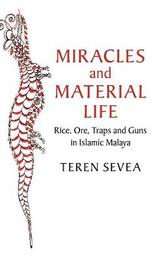
|
Miracles and Material Life: Rice, Ore, Traps and Guns in Islamic Malaya
Hardback
Main Details
| Title |
Miracles and Material Life: Rice, Ore, Traps and Guns in Islamic Malaya
|
| Authors and Contributors |
By (author) Teren Sevea
|
| Series | Asian Connections |
|---|
| Physical Properties |
| Format:Hardback | | Pages:290 | | Dimensions(mm): Height 236,Width 158 |
|
| Category/Genre | Asian and Middle Eastern history
Islam
Economic history
Mysticism, magic and ritual |
|---|
| ISBN/Barcode |
9781108477185
|
| Classifications | Dewey:297.2114 |
|---|
| Audience | | Professional & Vocational | |
|---|
| Illustrations |
Worked examples or Exercises; 2 Maps; 10 Halftones, black and white
|
|
Publishing Details |
| Publisher |
Cambridge University Press
|
| Imprint |
Cambridge University Press
|
| Publication Date |
30 July 2020 |
| Publication Country |
United Kingdom
|
Description
In this ground-breaking new study, Teren Sevea reveals the economic, environmental and religious significance of Islamic miracle workers (pawangs) in the nineteenth- and twentieth-century Malay world. Through close textual analysis of hitherto overlooked manuscripts and personal interaction with modern pawangs readers are introduced to a universe of miracle workers that existed both in the past and in the present, uncovering connections between miracles and material life. Sevea demonstrates how societies in which the production and extraction of natural resources, as well as the uses of technology, were intertwined with the knowledge of charismatic religious figures, and locates the role of the pawangs in the spiritual economy of the Indian Ocean world, across maritime connections and Sufi networks, and on the frontier of the British Empire.
Author Biography
Teren Sevea is a historian of religion in South and Southeast Asia at the University of Pennsylvania. He is the author of publications on Islamic connections of the Indian Ocean world, Sufism and Sufis of the Malay world, Islamic reform movements and Islamic erotology.
Reviews'This is a truly remarkable book. Combining empathy for Malay miracle-workers (pawang) with a sensitive analysis of 'magical' texts, Terenjit Sevea draws readers into a nineteenth century Malay world where the entwining of Islam with indigenous beliefs equipped pawangs with the esoteric knowledge that made them essential consultants in a range of socioeconomic activities.' Barbara Watson Andaya, University of Hawai'i 'Based on fine-grained analyses of a rich set of unexplored Malay sources, this book illuminates religion's constitutive role in economic and political relations. Informative and absorbing, it is an outstanding addition to the study of Islam, Sufism, and modern Asian history.' Shahzad Bashir, Aga Khan Professor of Islamic Humanities, Brown University, Rhode Island 'In this subtle and evocative work, Terenjit Sevea links the world of religiosity and wonders in colonial and Islamic Southeast Asia with the material world of agriculture, mining and hunting. Drawing on a wide variety of sources, some very unusual, he brings together material and cultural histories in ways that will be profitable for scholars of many other world regions. His analysis takes us far beyond the 'disenchantment' paradigm that long dominated colonial histories.' Sanjay Subrahmanyam, University of California, Los Angeles
|